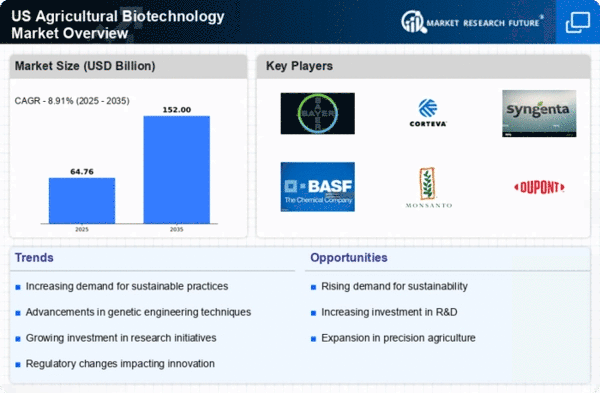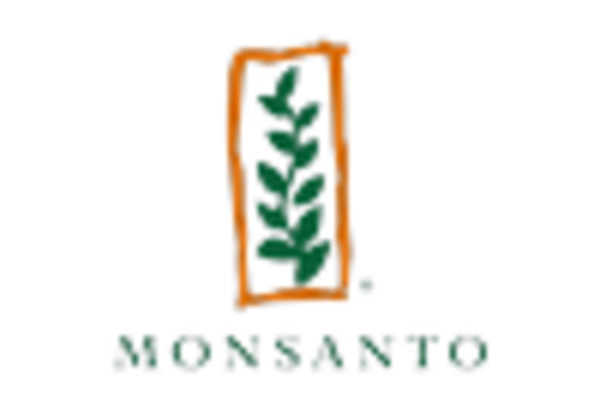Government Support and Funding
Government support plays a significant role in the agricultural biotechnology market. Various federal initiatives aim to promote research and development in biotechnology, providing funding and resources to enhance innovation. The USDA and other agencies have allocated substantial budgets for biotechnology research, with funding exceeding $1 billion annually. This financial backing fosters collaboration between public and private sectors, facilitating advancements in agricultural practices. As a result, the agricultural biotechnology market is likely to benefit from increased investment, leading to the development of new technologies and improved crop varieties.
Rising Demand for Food Security
The market is experiencing a notable surge in demand driven by the increasing need for food security.. As the global population continues to grow, projected to reach approximately 9.7 billion by 2050, the pressure on food production systems intensifies. In the US, agricultural biotechnology plays a crucial role in enhancing crop yields and improving resistance to pests and diseases. This is particularly relevant as the USDA reports that biotechnology-derived crops can yield up to 20% more than conventional varieties. Consequently, the agricultural biotechnology market is positioned to address these challenges, ensuring a stable food supply while minimizing environmental impact.
Advancements in Biotechnology Research
Innovations in biotechnology research are propelling the agricultural biotechnology market forward. The development of CRISPR and other gene-editing technologies has opened new avenues for crop improvement. These advancements allow for precise modifications, enhancing traits such as drought tolerance and nutritional content. According to the USDA, the market for biotechnology seeds in the US reached approximately $10 billion in 2024, reflecting a growing acceptance of these technologies among farmers. As research continues to evolve, the agricultural biotechnology market is likely to witness further growth, driven by the need for efficient and sustainable agricultural practices.
Consumer Acceptance of Biotech Products
Consumer acceptance is a pivotal driver for the agricultural biotechnology market. As awareness of the benefits of genetically modified organisms (GMOs) increases, more consumers are recognizing the role of biotechnology in enhancing food quality and safety. Surveys indicate that around 60% of US consumers are open to purchasing biotech-enhanced products, provided they are clearly labeled. This shift in consumer perception is encouraging food manufacturers to incorporate biotech ingredients, thereby expanding the agricultural biotechnology market. The ability to meet consumer demands for transparency and sustainability is likely to shape the future landscape of this market.
Environmental Sustainability Initiatives
Environmental sustainability initiatives are increasingly influencing the agricultural biotechnology market. With growing concerns about climate change and its impact on agriculture, there is a push for biotechnological solutions that promote sustainable farming practices. The agricultural biotechnology market is responding by developing crops that require fewer inputs, such as water and fertilizers, thereby reducing the environmental footprint. For instance, biotech crops can lead to a reduction in pesticide use by up to 50%, according to USDA data. This alignment with sustainability goals is likely to enhance the market's appeal to both farmers and consumers, driving further adoption.
















